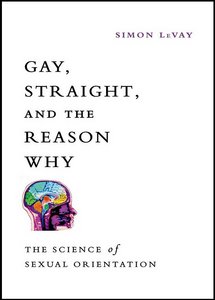
Heterosexuality is romantic attraction, sexual attraction or sexual behavior between people of the opposite sex or gender. As a sexual orientation, heterosexuality is "an enduring pattern of emotional, romantic, and/or sexual attractions" to people of the opposite sex; it "also refers to a person's sense of identity based on those attractions, related behaviors, and membership in a community of others who share those attractions." Someone who is heterosexual is commonly referred to as straight.
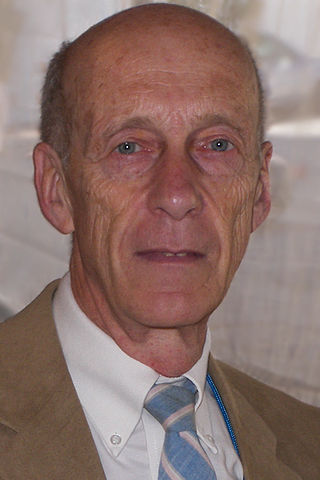
Simon LeVay is a British-American neuroscientist.

Eros and Civilization: A Philosophical Inquiry into Freud is a book by the German philosopher and social critic Herbert Marcuse, in which the author proposes a non-repressive society, attempts a synthesis of the theories of Karl Marx and Sigmund Freud, and explores the potential of collective memory to be a source of disobedience and revolt and point the way to an alternative future. Its title alludes to Freud's Civilization and Its Discontents (1930). The 1966 edition has an added "political preface".

Gay Science: The Ethics of Sexual Orientation Research is a 1997 book by the philosopher Timothy F. Murphy about scientific research on sexual orientation.

Situational sexual behavior differs from that which the person normally exhibits, due to a social environment that in some way permits, encourages, or compels the behavior in question. This can include situations where a person's preferred sexual behavior may not be possible, so rather than refraining from sexual activity completely, they may engage in substitute sexual behaviors.

Virtually Normal: An Argument About Homosexuality is a book about the politics of homosexuality by the political commentator Andrew Sullivan, in which the author criticizes four different perspectives on gay rights in American society, which he calls the "Prohibitionist", "Liberationist", "Conservative", and "Liberal" views, seeking to expose internal inconsistencies within each of them. He also criticizes the philosopher Michel Foucault and gay rights activists he considers influenced by Foucault, and argues in favor of same-sex marriage and an end to the don't ask, don't tell policy, which banned service by openly gay people in the US military. However, he makes a case against legislation aimed at preventing private discrimination against gay people.

Virtual Equality: The Mainstreaming of Gay and Lesbian Liberation is a 1995 book about gay rights by lawyer and civil rights activist Urvashi Vaid, in which the author argues that LGBT movements in the United States have been only partially successful in achieving their goals, and that gay and lesbian Americans continue to suffer from discrimination and other problems. Vaid maintains that the American gay rights movement must reconsider its tactics and move from advocacy of civil equality to aiming at social change.

Why Freud Was Wrong: Sin, Science and Psychoanalysis is a book by Richard Webster, in which the author provides a critique of Sigmund Freud and psychoanalysis, and attempts to develop his own theory of human nature. Webster argues that Freud became a kind of Messiah and that psychoanalysis is a pseudoscience and a disguised continuation of the Judaeo-Christian tradition. Webster endorses Gilbert Ryle's arguments against mentalist philosophies in The Concept of Mind (1949), and criticizes many other authors for their treatment of Freud and psychoanalysis.

The Assault on Truth: Freud's Suppression of the Seduction Theory is a book by the former psychoanalyst Jeffrey Moussaieff Masson, in which the author argues that Sigmund Freud, the founder of psychoanalysis, deliberately suppressed his early hypothesis, known as the seduction theory, that hysteria is caused by sexual abuse during infancy, because he refused to believe that children are the victims of sexual violence and abuse within their own families. Masson reached this conclusion while he had access to several of Freud's unpublished letters as projects director of the Sigmund Freud Archives. The Assault on Truth was first published in 1984 by Farrar, Straus and Giroux; several revised editions have since been published.
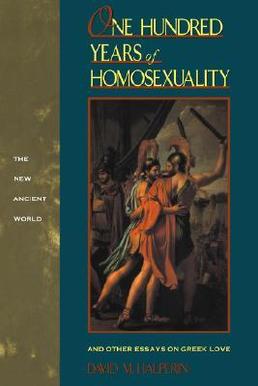
One Hundred Years of Homosexuality: and other essays on Greek love is a 1990 book about homosexuality in ancient Greece by the classicist David M. Halperin, in which the author supports the social constructionist school of thought associated with the French philosopher Michel Foucault. The work has been praised by several scholars, but criticized by others, some of whom have attributed to Halperin the view that the coining of the word "homosexuality" in the nineteenth century brought homosexuality into existence. The book was often reviewed alongside John J. Winkler's The Constraints of Desire (1990).

A Separate Creation: The Search for the Biological Origins of Sexual Orientation, also published with the subtitle How Biology Makes Us Gay, is a 1996 book about the development of sexual orientation by the journalist Chandler Burr. It received mainly positive reviews, commending it as a useful discussion of scientific research on sexual orientation and the politics surrounding the issue.

Homosexuality: A Philosophical Inquiry is a 1988 book by the philosopher Michael Ruse, in which the author discusses different theories of homosexuality, evaluates the moral status of homosexual behavior, and argues in favor of gay rights.
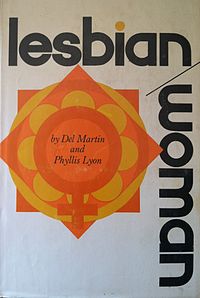
Lesbian/Woman is a work by the feminist and gay rights activists Del Martin and Phyllis Lyon, in which the authors discuss what it means to be a lesbian. The book was influential and is considered a foundational text of lesbian feminism. Reviewers believed that it benefited from its authors' personal experience as lesbians, and endorsed its criticisms of the treatment of lesbians by religious and professional organizations.

Growing Up Straight: What Every Thoughtful Parent Should Know About Homosexuality is a 1968 guide for parents, by Peter and Barbara Wyden, which he claims can prevent their children from becoming homosexual. Stanley Yolles, head of the National Institute of Mental Health, wrote an introduction.

The Homosexual Matrix is a book by American psychologist Clarence Arthur Tripp, in which the author discusses the biological and sociological implications of homosexuality, and also attempts to explain heterosexuality and bisexuality. The book was first published in 1975 by McGraw-Hill Book Company; it was republished in a revised edition in 1987. Based on his review of the evidence, Tripp argues that people do not become homosexual due to factors such as hormone levels, fear of the opposite sex, or the influence of dominant and close-binding mothers, and that the amount of attention fathers give to their sons has no effect on the development of homosexuality. He criticizes Sigmund Freud and argues that psychoanalytic theories of the development of homosexuality are untenable and based on false assumptions. He maintains that sexual orientation is not innate and depends on learning, that early puberty and early masturbation are important factors in the development of male homosexuality, and that a majority of adults are heterosexual because their socialization has made them want to be heterosexual. He criticizes psychotherapeutic attempts to convert homosexuals to heterosexuality and argues in favor of social tolerance of homosexuality and non-conformist behavior in general.
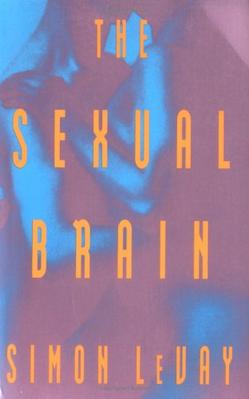
The Sexual Brain is a 1993 book about brain mechanisms involved in sexual behavior and feelings, and related topics such as sexual orientation, by the neuroscientist Simon LeVay. The book was praised as a well-written work on science. However, some reviewers pointed out factual errors, and noted that LeVay failed to prove that homosexuality has a biological basis.

Sexuality and Its Discontents: Meanings, Myths, and Modern Sexualities is a 1985 book about the politics and philosophy of sex by the sociologist Jeffrey Weeks. The book received positive reviews, crediting Weeks with explaining the theories of sexologists and usefully discussing controversial sexual issues. However, Weeks was criticised for his treatment of feminism and sado-masochism.

Sex and Reason is a 1992 book about human sexuality by the economist and federal judge Richard Posner, in which the author attempts to explain sexual behavior in economic terms and discusses a range of controversial subjects related to sex, proposing reforms in American laws.

What Wild Ecstasy: The Rise and Fall of the Sexual Revolution is a 1997 book about the sexual revolution by John Heidenry. The book received mixed reviews. It was described as interesting and Heidenry was complimented for his discussions of figures such as Bob Guccione, Hugh Hefner, Larry Flynt, and Reuben Sturman. However, he was criticized for his research methods. He was accused of plagiarism because of the use he made of material by other writers, receiving criticism in particular from the journalist Philip Nobile. Critics also wrote that he focused disproportionately on pornography and gave insufficient attention to feminism and women's issues.

The Science of Desire: The Search for the Gay Gene and the Biology of Behavior is a 1994 book by the geneticist Dean Hamer and the journalist Peter Copeland, in which the authors discuss Hamer's research into the genetics of homosexuality.
